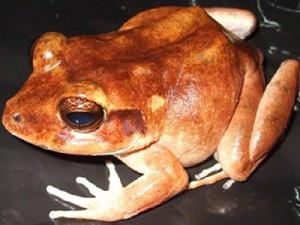Edward Narayan
Other projects
15 Apr 2008
Monitoring the Reproductive Success of Endangered Fijian Ground Frog on Viwa Islands
13 Jul 2011
Community Led Exclusion of Invasive Cane Toads from Breeding Sites of the Endangered Fijian Ground Frog (Platymantis vitiana) on Viwa, Fiji Islands
The primary aim of this project is to find out if Chytrid fungus (Batrachochytrium dendrobatidis) occurs amongst endangered Fijian ground frog (Platymantis vitiana) populations. This key investigation has to be completed before we can establish a conservation management plan for P. vitiana.

Fijian ground frog close-up shot.
During the past three decades, a number of amphibian populations have undergone severe declines, some of which have resulted in extinction (Blaustein and Wake, 1990; Pimm et al., 1995; Stuart et al., 2004). Globally, many of these declines have been linked to the emergence of chytridiomycosis, a disease caused by the recently discovered fungal pathogen Chytrid fungus Batrachochytrium dendrobatidis (Berger et al., 1998; Daszak et al., 2003; Kriger and Hero, 2007; Hero and Morrison, 2003). New Zealand's first case of this disease, Chytridiomycosis, was diagnosed in a population of golden bell frogs Litoria raniformis (Waldman, 2001).

Fijian ground frog.
The high prevalence of Chytrid fungus in Australia and New Zealand and its prevalence in cool and moist habitats are strong indicators for investigating the prevalence of this disease within isolated natural frog populations in Fiji Islands. Currently, chytridiomycosis is the only explanation, for which supporting evidence is available, for the global ‘‘enigmatic’’ declines and disappearances of frog populations and species (Skerratt et al., 2007). The discovery of Chytrid fungus in native Fijian ground frog (Platymantis vitiana) populations in Fiji Islands could be the major missing piece of the conservation puzzle solving the cause of recent native frog population declines in Fiji Islands.